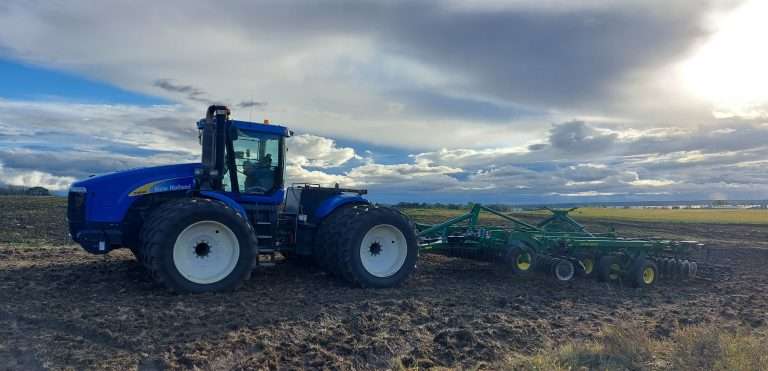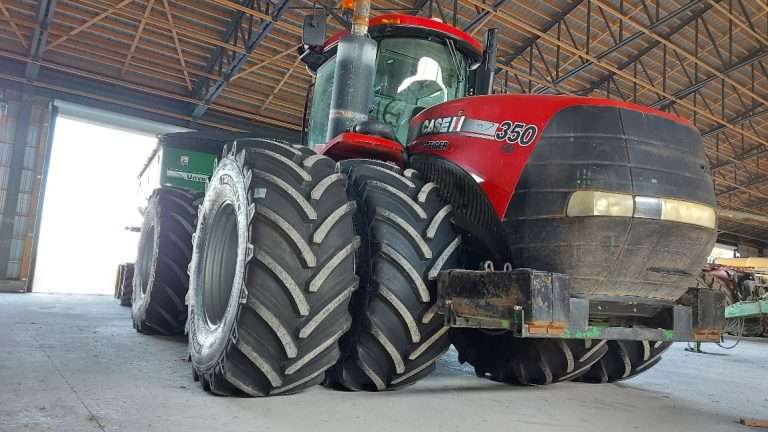ceat-speciality:blogs-tags/all,ceat-speciality:blogs-tags/tire-advice
Choosing the Right Tire Setup for Your Tractor
Mon, 2 Jan 2023 | PRODUCTS
Choosing a tire setup is more complex than choosing your tractor, says Brent Sisson, Agricultural Tire Specialist for Tirecraft Sarnia in Ontario, Canada.
For some criteria, such as traction in the field and ride on the road, you will know fairly soon whether you made the right decision. Concerning the very important metric of cost per hour, you cannot ascertain that until the tire is worn out. Then you can compare the acquisition price to the number of hours of service.
“For myself, it’s about a 4-year process before I can feel confident in telling my customers I have confidence in a product,” Sisson notes. “I have to see it first hand with known comparisons. Some brands that are positioned as a premium don’t meet my requirements. There is definitely a good size market for good midline tires such as CEAT. I just try to provide the best information I can, and let the customer decide.”
Sisson says, “CEAT is one brand that has surpassed my requirements. They provide a high quality, precision product. We have had lots of excellent customer feedback.”
When choosing a tire for your tractor, Sisson recommends basing your decision on the following:
The size, model and designation of the tire that is optimal for a particular tractor
“The space limitations on the tractor will somewhat dictate what you can use. Choose a taller tire to provide a longer, more efficient contact area and provide the most volume.
Keep in mind the need to retain reasonable clearances. Consider your other requirements for overall width, track width, row width, what type of surface, draft hp, weight and speed you will be using this tractor for. You want to choose a tire that meets or exceeds all of your requirements.
Usually the larger volume tire will give you the best chance at lowering soil impact. All soil types benefit from lower compaction. A good rule of thumb is a field pressure from 8-15 psi for an optimum setup.
In row crop situations you may want to consider multiple tire setups and/or IF/VF options (like the CEAT Torquemax VF) to make the best choice for your situation. Choose a model and size with the traction/wear trade off that suits your needs best. Another factor farmers are up against lately is availability. Having a ‘one off’ tire or a low production size is not good if you ruin a tire and there are no replacements.
Consider value
Usually choosing something on the premium side will provide more value . . . in terms of price per hour of use, as well as the ability to maintain excellent traction, wear and ride quality during the life of the tire. A company that offers a better warranty is probably a sign that you won’t need to use that warranty (CEAT Ag radials are backed with a 7-year warranty along with a 3-year field hazard warranty). A brand that is supported by the supplier and the manufacturer is key. Be aware that some brands don’t offer much warranty and some brands have a warranty but have trouble admitting their product may have deficiencies.
Choosing a tire today based on price can be misleading. There are some higher priced brands I would put to the lower end of premium, if not higher side of mid range. Sometimes the most expensive is not the best. You really need the advice of a trusted expert. Keep in mind money and honesty are rarely found together. Salespeople tend to promote what they have to sell, so it is hard to get a non-biased advisor. Sometimes salespeople may be excited about their offerings, but really don’t have the experience to know if they are a good value. Independent testing results are another way, but these have been misrepresented by omitting or including some of the comparisons with competitor tires.”
The bottom line, according to Sisson, get advice from a trusted Ag tire dealer and then do some homework of your own on the brand he recommends. Finally, keep good records on the hours of service per tire so you can compare the hours with the acquisition price.











































